Imangi Studios创始人讲述工作室的成败经验
作者:Lee Bradley
Imangi Studios真是一个非同寻常的传奇。
该工作室由Keith Shepherd和Natalia Luckyanova夫妇成立,它是一家在极短时间内就迅速从行业底层攀升至高峰的公司。但其生长历程也并非一帆风顺,以下是Keith Shepherd谈论公司早期发展过程、经历的磨练,以及它如何进入顶级移动游戏开发商行列的内容。
辞掉全职工作
Imangi Studios的起源是Shepherd和Luckyanova对创建医疗应用这种枯躁工作心生厌倦。
Shepherd表示,“我和Natalia当时已经开始讨论自己创业的想法,所以我们想出一个方法,让她继续支持我们的生活——因为当时我在工作上最受挫,所以我先辞职并寻找将来的出路。”
“当时似乎正赶上好时机,因为苹果宣布推出的平台允许任何拥有电脑和编程技术的人,通过iTunes和App Store向全球用户发布应用。”
“我和Natalia都认为这真是太棒了。在此之前市场上还从来没有这样的平台,因此我们将其视为一个巨大的机遇。我们决定想想自己能做哪些东西,并准备向App Store开启项目。”
这个项目就是《Imangi》,也就是该工作室后来采用的名称,它的灵感来自Shepherd和Luckyanova通常玩《Scrabble》的游戏过程。《Imangi》是一款让玩家操控字母以拼出单词的益智游戏。
Shepherd称“我们用一个月时间制作了这款游戏,它是我们琢磨要做些什么东西的时候,脑海中冒出的主意之一。我们也知道自己想赶上App Store上线这趟早班车,所以就先做出了自己想到的第一个点子。我们就制作了这款小游戏,这真是个有趣的体验。”
小试牛刀
尽管夫妇二人都很高兴赶在App Store上线之际推出了一款游戏,但他们却对游戏最终的表现一无所知。
Shepherd回忆道,“这很有趣,当时你无法获得这些持续流动的数据,所以在月底之前你并不清楚自己的表现如何,我们对此束手无策。”
“我们当时给游戏标价3.99美元,我也并不认为自己会出现在榜单前列,没人知道究间有多少人会购买应用,或者市场上究间有多少台可以开发利用的手机等这类情况。”
“看得出来确实有些人在玩我们的游戏,因为我们看到了一些用户评价,也收到了一些邮件,但在首月销售报告出台之前我们确实不明真相。报告出来后我们发现自己进帐5000美元,我们欣喜若狂。”
“这是我们白手起家创造的游戏,也没有投入太多时间,但首月就创收了5000美元,这真是太神奇了!”
“所以我们大致算了一笔帐,假如我们每月制作一款游戏,一年就能创收6万美元。这真划算,那我就可以把这当成全职工作了!这想法很天真,但当时我们实在是太兴奋了。”
乍一看Imangi Studios确实能够在这种假设前提下存活下去,他们的下一款游戏《Word Squares》编程只花了一周左右,其市场表现甚至超过了第一款游戏。但是,该公司首次遭遇的失败也正悄悄降临。
急剧下滑
Shepherd称“我从小就玩街机类游戏,字谜游戏很有趣,但在我看来并不算真正的游戏。我想制作一些更适合真正玩家的游戏,所以我们决定制作一款3D雪橇游戏《Little Red Sled》。”
玩家在游戏中要一路躲过树木穿过雪山,并腾空表演特技。
“我们原先认为可以用三个月完成游戏,以便赶上在圣诞节发布,并认为这个计划很完美,冬天乘雪橇的游戏主题很应景,适合在圣诞节推出!但当时我们高估了自己的能力。”
“最终我们直到2月中旬才推出游戏。那时冬天已经快结束了,没有人还会对冰雪有兴趣,大家都在盼望春天降临。这对我们来说真是一个巨大的败笔。我们花了6个月制作游戏,这是我们初尝失败的滋味。”
但Shepherd和Luckyanova并没有因此而气馁,而是重整旗鼓,加倍努力。
“在《Little Red Sled》之后,我们就决定Natalia也辞职和我一起潜心开发游戏。这对于我们这样一家公司来说,是一个很大的风险。”
“此时我们双双为Imangi效力,依靠我们这三款游戏惨淡的收益为生,这三款游戏都不能算是热作。这真是我们公司史上最艰难的时期。”
掌握经验
夫妻二人的这一盘赌赢了。Imangi的下一款游戏《Harbor Master》是一款基于《Flight Control》式的画线游戏。
“它对我们来说算得上是迅速走红的热作。它在App Store晋升至第三名,获得许多用户的青睐。所以我们继续支持这款游戏,我们认为‘偶然的成功很罕见’所以我们得加倍投入精力。”
“我们又花了一年时间优化《Harbor Master》,因为它已经成为我们养家糊口的主要来源。”
这款游戏的iPad版本也伴随着iPad设备面世之际发布,它也是Imangi首次尝试免费增值模式的试验。
“正如我们希望赶在iPhone App Store上线时发布游戏一样,我们希望也能搭上iPad发布的顺风车。问题在于,当时我们已经没有时间制作新内容,所以就制作了一个充分利用了iPad更宽大屏幕这一优势的地图,并发布了免费版游戏。”
“我们认为制作一款免费的出色游戏,在竞争中应该会更有胜算。事实证明我们是对的。《Harbor Master HD》在iPad发布时成了该平台排名第一的游戏。”
“我们并没有从中赚到多少钱,但它把玩家引向了iPhone版本,这让我们获得了更多粉丝。这对我们来说真是好极了,它让我们知道免费模式的价值,让我们了解在某些情况下,让更多人玩你的游戏可能是更值得推崇的做法。”
不幸降临
在支持《Harbor Master》一段时间之后,Imangi又开始制作表游戏,并在2009年末发布了《Hippo High Dive》和《geoSpark》(游戏邦注:与《geoDefense》开发商Critical Thought Games合作推出)。
虽然这两款游戏都不算特别成功,但却维持了Imangi的发展。然而该工作室的下一款游戏,却带来了更大的影响,Shepherd将此称为“灾难性的失败”。
Shepherd称“当App Store吸引更多开发者,并涌现许多主流发行商之时,我们打算制作《Max Adventure》。”
“看到EA、Zynga和Gamelfot等大牌公司旗下的游戏云集于此,我们就在想自己如何才能从中突围?最后我们决定制作这些公司要做的游戏,也就是拥有许多内容、许多关卡的大型游戏。”
“《Max Adventure》就是我们自不量力的一个失败典型。我们花了一年时间开发这款大型游戏,等到我们发布游戏时,市场形势已经发生了许多变化。”
“我们在圣诞节时发布游戏,当时是EA首次将所有游戏降至99美分,所以这他们的游戏占据了榜单多数席位,我们的游戏却难见天日。”
“我们为这款游戏而自豪,但它并没有获得市场共鸣。它并没有成为热作。”
《Temple Run》问世
Shepherd认为除了市场形势之外,还有其他原因导致《Max Adventure》难获成功。
“最令人抓狂的问题在于,我们背离了制作易上手休闲游戏的原则,制作了更为依靠内容驱动的游戏,并且它还采用了双摇杆控制方式,看起来并不像是适合触屏iPhone的游戏。”
“这正是我们为《Temple Run》设计控制方式时考虑到的一个问题”,为了让触屏设备的控制方式更为直观,Imangi尝试了多种不同设置方法。
Shepherd和Luckyanova最终使用基于划动的手势控制方式,让游戏角色沿着直线路径转弯。这一结果取得满意结果之后,游戏的其他部分也顺利到位。
“有了这些90度大转弯,游戏中的迷宫环境让人感觉更妙,所以我们决定给它一个主题,让玩家在寺庙断壁残垣这种环境中奔跑,这正是《Temple Run》的演变过程。”
《Temple Run》于2011年夏季上线,最初售价为99美分。虽然它一开始就颇受好评,但直到Imangi将其转变为免费模式时,它才真正走红,跻身免费榜单第三名。
“正如我们的预料,之后它开始下滑,但奇怪的是,它的排名又开始停止下跌了。”
“之后两个月发生的事情太神奇了。它在榜单的位置开始缓慢回升,先是在第100名,两天之后升到第98名,然后是97,然后是95。就这样,它慢慢地向上攀升到了免费游戏榜单第一名的位置。”
“它的下载量不但在免费榜单呈上升趋势,在营收榜单也同样如此。我们这款游戏在2012年1月份同时在这两个榜单登顶,我们还看到游戏如星火燎原一样扩展和蔓延。”
“我们并没有给它打广告,我们也没有投入任何营销费用。但大家就是下载了这款游戏。”
巩固地位
在《Temple Run》获得成功的四年之前,Shepherd和Luckyanova二人都没有做过游戏,但他们现在已然是世界领先的移动游戏开发者。
《Temple Run》如此成功以致于2012年迪士尼都要与该工作室合作,联合推出基于皮卡斯电影《勇敢传说》的衍生游戏《Temple Run:Brave》——它至少在111个国家/地区的iOS游戏榜单登顶。
Imangi很擅长利用这一品牌的成功机遇,推出了一系列周边产品,并抓住一些创造可观收益的跨媒体合作机会,并于本月再推出一款基于迪士尼电影《魔境仙踪》的《Temple Run》衍生游戏。
这些合作项目反过来又增强了《Temple Run》的人气,该作目前下载量已超过1.7亿次。
有了如此庞大的玩家群体,Inangi又在2013年1月份出人意料地推出了《Temple Run 2》。
Shepherd称“这一举措是必须的。我们总是埋头做事,太专注于推出游戏,因此没有精力理会营销层面的事情,所以没来得及发布《Temple Run 2》的消息。”
“我们只是寄希望于,既然有这么多人喜欢原作,那么我们要是推出了续作,大家一定会很兴奋。”
保持小规模
虽然坐拥足以令大型公司自豪的硕果,Shepherd和Luckyanova仍然在家办公,Imangi Studios仍然保持小型团队规模。
即使是《Temple Run 2》也只有5名开发者。
Shepherd坦言“我们喜欢制作和开发游戏。如果我们扩大规模,那就会改变公司的动态,我和Natalia就得负责管理公司而不是做自己喜欢的事情。”
“我们没有投资者,我和Natalia都是草根出身,自立门户。我们也没有那种外部压力或风投机构,或者最终出售公司的目标。”
“我认为我们有足够的灵活性去做自己喜欢的事情,现在保持较小规模挺适合我们的生活方式。”
至于未来,Shepherd表示已经实现了他自己梦想,“我们仍将专注于支持《Temple Run》项目,我们将推出一些很酷的更新内容,以及许多有趣的东西。我们也想制作更多游戏,有可能让公司扩大一点来以便协助管理这个品牌。”
“但我不知道这会在什么时候实现。我们很幸运,因为我们能够继续走自己的路。”(本文为游戏邦/gamerboom.com编译,拒绝任何不保留版权的转载,如需转载请联系:游戏邦)
To the top with Temple Run: Imangi Studios, a studio profile
by Lee Bradley
Imangi Studios’s story is remarkable.
Founded by the husband and wife team Keith Shepherd and Natalia Luckyanova, it’s a company that has reached the pinnacle of the industry from very humble beginnings in an incredibly short period of time.
Yet it has also endured its fair share of disasters along the way.
In our latest studio profile we talk to Keith Shepherd about Imangi’s early days, its mistakes, and how it has achieved its ultimate position as one of the leading mobile games developers in the world.
Quitting the day job
Imangi Studios was born from Shepherd and Luckyanova’s growing disappointment with their jobs programming apps for the health care industry.
“Natalia and I had been talking about starting a company for a long while,” says Shepherd, “so we worked out a deal where she would continue to support us and I – because I was most frustrated with my job – would quit and figure out what I was going to do next.”
“It happened to be perfect timing, because around that time Apple announced that they were creating this platform to allow anyone with a computer and some programming skills to make software to distribute to a global audience through iTunes and the App Store.
“Natalia and I thought it was really awesome. There really hadn’t been a platform like this before, and we saw it as a huge opportunity. We decided to think of something that we could make and get up on the App Store as kind of a fun project.”
That project was Imangi, the game from which the studio would take its name. Inspired by Shepherd and Luckyanova’s regular Scrabble sessions, Imangi is a puzzle game in which players manipulate letters to form words.
Imangi for iOS
“So we had about a month to make this game,” says Shepherd. “It was one of the first things that came to mind when we were thinking of something to make. And we knew we wanted to be there for the launch of the App Store, so we kinda just went with the first idea that came to mind.
“We built this little game, got it out, and it was a really fun experience.”
Reception
Pleased that they had managed to release a game in time for the App Store’s launch, Shepherd and Luckyanova were nevertheless in the dark about the game’s initial performance.
“It’s funny,” says Shepherd. “Back then you didn’t get this constant stream of data so you didn’t know how you were doing until the end of the month. We had no idea.
“We were selling the thing for $3.99 and I don’t think we were at the top of any of the charts, but nobody had any idea how many people were buying apps or how many phones were out there or any of that kind of thing.
“We could tell that some people were playing because we had some reviews and we had some emails, but we really had no idea until that first month sales report came in. When it did I think we made $5,000 and we were just ecstatic.
“It was something we had created from scratch and we didn’t spend a ton of time making it and we made $5,000 in our first month, it was awesome!
“So we kinda did the math and said, well if we make a game a month we could make $60,000 a year. That’s a salary. I could do this as my full-time job! It was naive, but we were so excited that we had made something and it was selling.”
Initially it looked like Imangi Studios may live up to that promise, as their next game Word Squares took around a week to code and even outperformed their debut release. However, the company’s first real taste of failure was looming.
Slippery slope
“I grew up playing more like arcade type games and stuff,” says Shepherd. “Word puzzles are fun but they weren’t my passion in terms of actual games. I wanted to make more of a gamer’s game, so we decided to make this 3D sledding game called Little Red Sled.”
Little Red Sled saw players navigating their way down snowy mountains while dodging trees, catching air and performing tricks.
Little Red Sled
“I thought we could make it in like 3 months, in time for a Christmas release,” says Shepherd. “And we thought that was perfect; a winter themed sledding game for kids, it’ll be a perfect Christmas time app! But I way, way overestimated our capabilities.
“Ultimately we didn’t get it out until the middle of February. Winter was coming to an end, nobody was interested in snow any more and everyone was ready for spring to come. It was a huge flop for us. We had spent six months doing it and it was our first taste of failure.”
Rather than be dissuaded from their dream, however, Shepherd and Luckyanova redoubled their efforts.
“Right after Little Red Sled, that was when we made the decision to have Natalia quit her job and join me making games full-time. It was a big, risky time for us as a company,” says Shepherd.
“So at this point we were both working at Imangi and living off of our measly income from these three games, none of which I would call a hit. It was a critical moment in the history of our company, deciding to go all in.”
Mastered
The gamble payed off. lmangi’s next game would be Harbor Master, a riff on the popular line-drawing title Flight Control.
“It turned out to be a really big hit for us,” says Shepherd. “It went to number three on the App Store, and people were loving it. So we just kept on working on it. We thought ‘Hey success is very rare’ so we doubled down our efforts.
“We spent the next year or so making Harbor Master better because it had become our bread and butter. That’s was what was paying our bills.”
Harbor Master
Foreshadowing their future success, the iPad version of Harbor Master – launched alongside the device itself – was to be Imangi’s first experiment with free-to-play.
“Just as we had been a part of the App Store launch with the iPhone, we wanted to be a part of the iPad launch,” says Shepherd. “The problem was that we didn’t have time to make new content, so we made one map that took advantage of the larger screen and released it as a free app.
“We thought that by making a great game that was free, hopefully the competition wouldn’t be as stiff. And we were right. When the iPad launched Harbor Master HD was the number one game on the platform.
“We didn’t make much money from it, but it drew players to the iPhone version we ended up with a lot more fans. That was really good for us, it showed us the value of free and how in some cases it might be better just to have more people playing your games.
Misadventure
After a protracted spell supporting Harbor Master, Imangi got back to creating new games, releasing Hippo High Dive and geoSpark (a collaboration with geoDefense creator Critical Thought Games) towards the end of 2009.
While neither title was particularly successful, they helped keep Imangi ticking over. The Studio’s next release, however, was to have far more profound effect, something that Shepherd has described as an “epic failure.”
Max Adventure
“We set out to make Max Adventure at a time when the App Store was getting much more crowded and a lot of the major publishers were starting to dominate,” says Shepherd.
“People like Electronic Arts, Zynga and Gameloft were making all these epic games and we thought how are we going to compete? Ultimately we decided to make the type of game that these guys would make, a big epic game that had a lot of content, and a lot of levels.
“Max Adventure was a classic mistake of biting off more than we could chew. We just made this huge game that took us a year to develop and by the time we released it the market had changed so much.
“We launched it at Christmas, but it was the first Christmas where EA dropped all of their games to 99c and they just totally crushed the charts. We just drowned and got no attention.
“We were proud of the game, but it didn’t resonate. It never became a hit for us.”
On the run
Beyond the marketplace problems that hindered Max Adventure’s success, Shepherd also identifies other issues.
“The biggest frustration we had was that we strayed from making these pick-up-and-play casual games and made something more content driven. And it had dual-stick controls and it didn’t really feel like a game that belonged on the iPhone with a touch screen.
“That was what led us to coming up with the control scheme for Temple Run,” says Shepherd, as the studio experimented with various methods that felt native to touch screen devices.
Shepherd and Luckyanova settled upon using swipe-based gestures to have an avatar turn corners along a linear route. Pleased with the results, the rest of the game just fell into place.
“With these 90 degree turns, it felt right to have a maze-like environment. It felt really good. So we themed it out so that you’re running on some kind of temple wall. That’s really what evolved into what Temple Run became.”
Launched in the summer of 2011, Temple Run initially cost 99c. Well received, it wasn’t until Imangi flipped the switch to make the game free that it really took off, enjoying a temporary stay at number three in the free charts.
“Then it started falling again, as we had kinda expected,” says Shepherd. “But something strange happened. It stopped falling.
“What happened over the next couple of months was magical. It slowly started climbing back up the charts. It was at 100, then a couple of days later it was at 98, then 97, then 95. It just had this really kinda slow rise, and it actually went all the way up the charts to the number one free game.
“This whole time it was climbing on the downloads side, on the free charts, it was also climbing in the top grossing charts. We hit the number one in both charts right around the same time in January of 2012. And what we had witnessed was that essentially the game had gone viral.
“We weren’t advertising it, we weren’t paying for any marketing. People just latched onto it.”
Consolidating
Just four years prior to Temple Run’s success, both Shepherd and Luckyanova had not even made a game. Now they were among the world’s leading mobile game developers.
Indeed, such was Temple Run’s popularity that in 2012 Disney approached the studio to create a spin-off title to help promote their upcoming Pixar movie, Brave. Similarly popular, Temple Run: Brave became the number one ranking iOS game in no less than 111 countries.
Temple Run and Temple Run: Brave
Imangi has proved adept at capitalising on the franchise’s success, with a range of merchandising and transmedia opportunities providing lucrative revenue streams and a further Disney themed Temple Run spin-off, based around Oz: The Great and Powerful, due to launch this month.
All of this has fed back into the popularity of the original Temple Run, which has now been downloaded over 170 million times.
This huge player base allowed Imangi to surprise everyone in January 2013 with the unheralded release of Temple Run 2.
“It kinda came out of necessity,” says Shepherd. “We just had our heads down and we were so focused on getting the game out and finished that as we got closer to release we hadn’t spun up the marketing side of the house to kinda get the news out there.
“We just hoped that because so many people had enjoyed the original, that if we were to release it people would get excited about it.”
They did. In its first 13 days of availability on iOS, Android and Kindle devices, Temple Run 2 was downloaded over 50 million times, making it the fastest growing mobile title in history.
“The game has performed beyond our wildest dreams,” said Shepherd at the time.
Staying Small
Despite boasting the kind of success of which giant corporations would be proud, Shepherd and Luckyanova still work from home and Imangi Studios has remained deliberately small.
Even Temple Run 2 was developed by just five people.
Temple Run 2
“We like making and developing games,” says Shepherd. “And if we were to grow it would really change the dynamic of the company and Natalia and I would end up managing the company instead of doing what we love.
“We don’t have investors, Natalia and I bootstrapped, funded the company ourselves. We don’t have any of this outside pressure, or venture capital, or anything like that where the goal is to ultimately sell the company.
“I think we have the flexibility to go where we want to go. For now it suits our lifestyle to stay small.”
As for the future, Shepherd talks with the ease of a man who has already realised his dream.
“I think we’re going to continue to focus on Temple Run,” he says. “We’ve got some cool updates on the way, a lot of neat stuff. We’ll continue to focus on that for a while and at some point we’d like to make some more games. We may grow a bit more to help manage the franchise.
“I dunno, we’re kinda taking one day at a time. We’re just very fortunate that we can continue down whatever path we want to.”(source:pocketgamer)



























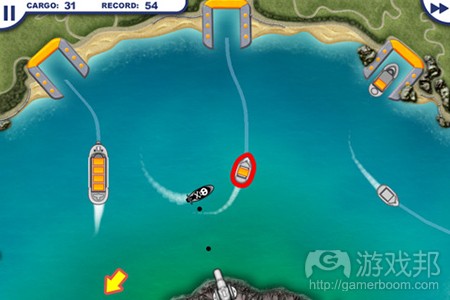
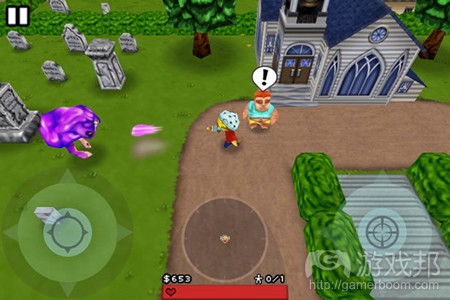
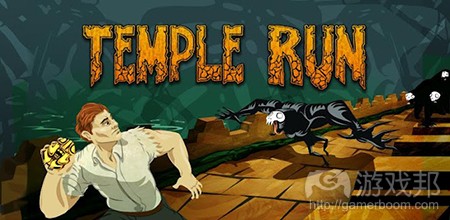
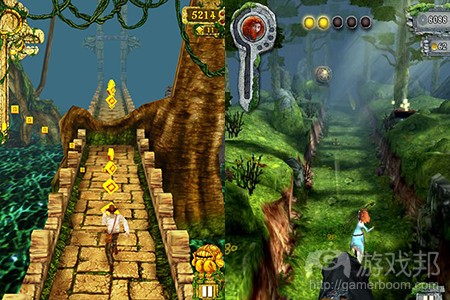
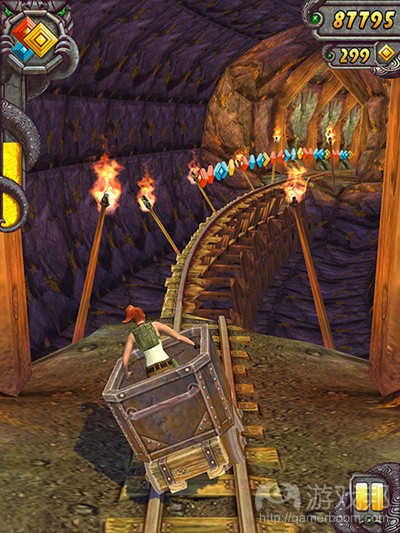














 闽公网安备35020302001549号
闽公网安备35020302001549号